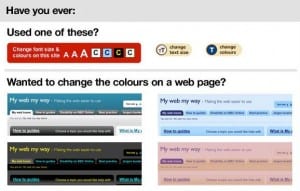Talking to a group of level three online-journalism students about digital divides. The group made accurate suggestions for what digital divides might look like, including incompatible file formats, unequal access to computers in different parts of the world and people having access problems with content. All perfect examples of digital inequities and discrimination.
I’m suggesting it’s the responsibility of the Web Workers (eg developers, designers, content creators etc) to ensure accessibility and a student asks if accessibility should be the responsibility of the user instead. That’s a really good question. We all want to be independent and in control of our lives via all the appropriate tools. In an increasingly digital society, we want equal access to online communication, information and entertainment. So should web workers design content to be accessible, or should the technology have an interface which translates the digital data uploaded by the developer into customised content for the user?
The BBC My Display http://www.bbc.co.uk/accessibility/mydisplay/ trial seemed to be a step in this direction. My Display encouraged users to customise the text and colours to suit their own preferences, with these choices being stored as a cookie for the next time.
Multiple reasons given for the My Display trial being withdrawn. These included the new and unexpected complexity of digital resources, content being delivered by IP on multiple platforms, operating systems and browsers delivering more customisation features, cloud computing requiring bigger solutions and the move from static webpages to database driven webs with live feeds and richer interactions. The list goes on and the conclusion was the My Display trials were neither flexible nor scaleable enough ‘to cope with the growth, technical diversity and ambition of the BBC’s digital services’.
So although we have the access technology to ensure 100% accessibility on the part of the user, it looks like we are moving even further away from the focus on accessible content. This is close to other recent developments which try to shift responsibility for access onto the user. The re is the growing expectation that people should adjust their browser settings and the move towards directing users to separate accessibility web pages; ‘solutions’ which assume a confidence and competence with navigation, form fields and web jargon which many simply haven’t got. These answers are as unworkable as the My Display solution. At the present time it looks like it keeps coming back to the need for inclusive digital content in the first place.
